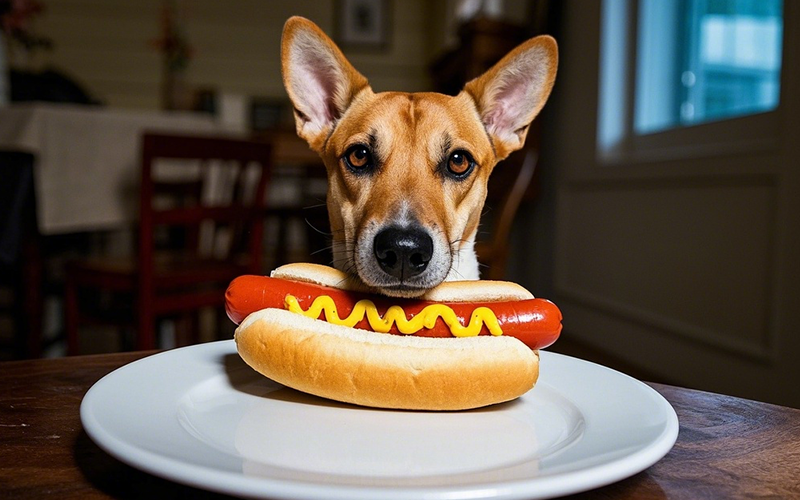Can Dogs Eat Hot Dogs? Here's What You Need to Know
- 28 Mar 2025 15:10
Hot dogs are a popular snack for people, but are they safe for dogs? While many dogs may love the taste of a hot dog, there are several things to consider before sharing one with your furry friend. Let’s take a closer look at the potential risks and benefits.

The Risks of Hot Dogs for Dogs
High in Sodium
Hot dogs are typically packed with sodium. Too much sodium can be harmful to dogs, leading to dehydration, increased thirst, and potentially even salt poisoning if consumed in large quantities. Excessive sodium intake can be particularly dangerous for dogs with heart disease or kidney problems. 🧂⚠️Processed Meats and Additives
Hot dogs are made from processed meats, which often contain preservatives and artificial additives like nitrates and nitrites. These chemicals can be harmful to your dog’s health over time. Processed meats can also be high in fat, which may contribute to obesity or cause digestive upset. 🏭Choking Hazard
Hot dogs, especially when not cut into smaller pieces, can present a choking hazard for dogs. They have a soft, slippery texture, which makes them easy to gulp down too quickly, potentially leading to choking or even blockages in the digestive tract. Always cut the hot dog into small, manageable pieces if you decide to feed it to your dog. 🍴High in Fat
Hot dogs are often high in saturated fat, which can be unhealthy for dogs, particularly in large quantities. Too much fat can lead to pancreatitis, a painful condition caused by inflammation of the pancreas. Dogs that are overweight or have pancreatitis should avoid fatty foods. 🍖
The Benefits of Hot Dogs for Dogs (In Moderation)
A Tasty Treat
Hot dogs are often highly palatable and can be a fun, tasty treat for dogs on special occasions. If your dog has a hard time getting excited about training treats, a small piece of hot dog can motivate them to learn new commands. 🍽️Protein Source
Hot dogs do provide a source of protein, but this should not be the main protein source in your dog’s diet. There are healthier, more nutritionally balanced ways to meet your dog’s protein needs, such as lean meats or specially formulated dog food. 🥩
How to Safely Serve Hot Dogs to Your Dog
Serve in Moderation
If you choose to give your dog a hot dog, it should only be an occasional treat, not a regular part of their diet. Offer only a small portion of the hot dog, and try to limit it to no more than a couple of bites at a time. 🍴Cut into Small Pieces
To reduce the risk of choking, cut the hot dog into small, bite-sized pieces before feeding it to your dog. This makes it easier for your dog to chew and swallow safely. 🐾Avoid Added Seasonings
Don’t give your dog hot dogs that are seasoned with spices, garlic, or onion, as these ingredients can be toxic to dogs. Stick to plain hot dogs with no added seasonings, and make sure to remove any bun or condiments. 🛑Choose Healthier Options
Look for healthier alternatives to traditional hot dogs, such as those made with lean meats or low sodium content. You can also try making your own dog-friendly version of a hot dog at home using lean turkey or chicken without the added seasonings. 🍗
What to Do if Your Dog Eats Too Many Hot Dogs
If your dog eats too many hot dogs or experiences any symptoms like vomiting, diarrhea, or stomach discomfort, it’s important to monitor them closely. If these symptoms persist or if your dog seems unusually lethargic, contact a pet health professional immediately. For quick assistance, you can reach out to PettureX for a 24-hour online consultation. 📱
The Bottom Line: Can Dogs Eat Hot Dogs?
While dogs can eat hot dogs in small amounts as an occasional treat, they should not be a regular part of their diet. The high sodium content, fat, and processed ingredients make hot dogs an unhealthy option if consumed frequently. If you do choose to give your dog a hot dog, serve it in moderation, cut it into small pieces, and avoid any added seasonings. Always prioritize healthier, dog-friendly treats to ensure your dog’s overall health and well-being.
If you're ever uncertain about the safety of certain foods for your dog, PettureX offers 24-hour online consultations to provide expert advice and guidance tailored to your dog’s health needs. 🌟🐶
Related

Why is Regular Dog Grooming So Important?
- 21 Jun 2025
Can Dogs Eat Kiwis? A Vet-Approved Guide to This Fuzzy Fruit
- 10 Jun 2025
Can Dogs Eat Curry? Unpacking Risks, Benefits, and Safe Alternatives for Your Canine Companion
- 3 Jun 2025
Can Dogs Eat Cooked Carrots? A Crunchy & Colorful Canine Query!
- 29 May 2025
Can Dogs Eat Cooked Cabbage? Unveiling the Crunchy Truth for Your Canine!
- 29 May 2025
Can Dogs Eat Citrus? Peeling Back the Zesty Truth for Your Pup!
- 28 May 2025
Can Dogs Eat Cinnamon Applesauce (A Little Bit)? The Sweet and Spicy Truth!
- 28 May 2025
Can Dogs Eat Chorizo? Sizzling a Warning for Your Furry Friend!
- 27 May 2025
Can Dogs Eat Chili? A Spicy Topic for Canine Consumption!
- 27 May 2025
Can Dogs Eat Raw Chicken? Unveiling the Risks and Realities
- 26 May 2025
